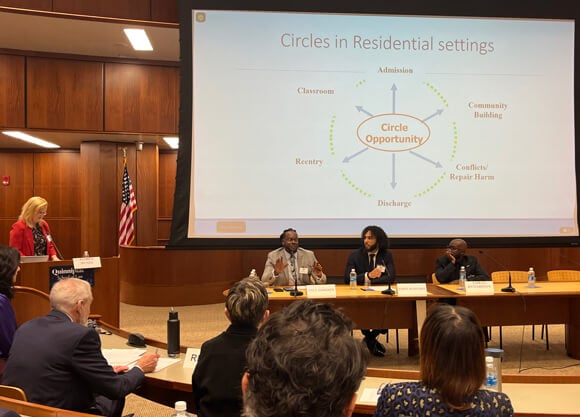
Impactful restorative justice and juvenile justice symposium inspires change
December 02, 2024

December 02, 2024

School of Law Dean Brian Gallini welcomed an impressive array of symposium speakers to the Brooke A. Goff Courtroom on the North Haven Campus on November 22. He noted the event’s overwhelming registration response underscored the critical nature of this conversation.
“Today’s focus on restorative justice and juvenile justice couldn’t be more timely and important,” Gallini said. “We’ve assembled an extraordinary group of experts and practitioners from Connecticut and beyond, including international guests, state legislators, and community leaders working directly with our youth."
Five panels of experienced speakers provided practical insights into areas of restorative justice and juvenile justice ranging from community-based programs to international best practices. The symposium’s culminating panel discussion focused on creating a blueprint for future legislation and rethinking policy in Connecticut.
The symposium was co-sponsored by the Quinnipiac School of Law and the James W. Cooper Fellows of the Connecticut Bar Foundation (CBF). CBF Executive Director Angela Schlingheyde said the foundation’s mission is to facilitate systemic change that advances civil justice for all, regardless of power or resources, to achieve a more just and equitable society.
“Today’s symposium is a vital part of that mission as we aim not only to educate ourselves on how restorative justice can be an effective tool in the juvenile justice setting, but also foster an ongoing conversation that leads to true systems change here in Connecticut. We need to ask how we can be doing better; how can we ensure every individual has a voice, equal access, and opportunity,” Schlingheyde said.
The symposium was co-chaired by professor Charles Pillsbury, Quinnipiac Distinguished Practitioner in Residence in Dispute Resolution, and Center on Dispute Resolution co-chair; and New Britain Superior Court Judge for juvenile matters, the Honorable Barbara Aaron.
“It’s been my pleasure to work with Juvenile Court Judge Barbara Aaron in planning this symposium,” Pillsbury said. “The vision, and the passion, has come from Judge Aaron. I don’t think there’s anybody in the state that cares more about young people.”
Aaron noted that the views she shared at the symposium were her own, and that she was not speaking on behalf of the judicial branch. Since 2019, Aaron has served as presiding judge in juvenile courts in Waterbury, Torrington, and currently New Britain.
“In every judicial district I’ve seen the incredible dedication of the people working in our juvenile youth justice system,” Aaron said. “No matter our roles, we all share three common goals: to strengthen families, guide youth away from crime, and help them engage with school and their communities in positive ways.”
Despite this collective hard work, efforts often fall short, Aaron said. She said challenges facing most of the youth entering the justice system, such as housing insecurity, substance abuse, and intra-and interfamily trauma, combined with the pervasive mental health crisis facing many young people, can overwhelm even the most well-intentioned systems.
Aaron also described how, too often, youth cycle through the educational and justice system without meaningful intervention or support; while those who have been harmed by crime are often left feeling unheard and unsupported by a court process that seems remote and unresponsive to their suffering and loss. Traditional approaches often make the problem worse by failing to address the root causes.
“As a society we often shift between two extremes – a strict ‘lock them up’ approach that emphasizes punishment; and a lenient revolving door approach that often lacks accountability,” Aaron said. “What we need is a balanced alternative. Restorative justice offers that balance. It combines accountability with empathy, fostering healing and resolution for everyone involved. While not a perfect solution for every situation or a panacea for all of society’s ills, it offers a more constructive path forward.”
Keynote speaker and panelist Robert “Roman” Haferd served as the District of Columbia’s first Restorative Justice Coordinator in the Office of the Attorney General. During his seven years in the role, Haferd participated in hundreds of successful restorative justice conferences resulting in completed agreements between defendants or respondents and the victims.
“My fellow facilitators and I have been very successful as restorative justice pioneers and practitioners. We’ve piloted a safe form of direct accountability for victims; we’ve overcome roadblocks and naysayers; we’ve set precedent. More importantly, we’ve healed hundreds of families and changed hearts and minds,” Haferd said.
Haferd said restorative justice is not simply a tool or an intervention, but a “spiritual call.”
“We have a goal today of visioning something together in your community, and I’m honoring that goal and that intention,” Haferd said. “Restorative justice is a critical tool for any justice community seeking to do good and earn that word ‘justice.’”
A group of distinguished moderators led over 20 panelists in meaningful discussions which invited audience interaction. Panels focused on restorative justice programs currently underway in some areas of Connecticut; the importance of working together with youth, families, and the community; the restorative justice discussion circle model; restorative justice taking place in other U.S. jurisdictions; an international view through the lens of restorative justice practices in New Zealand; strategies for a restorative place; and creating a restorative justice and juvenile justice blueprint for Connecticut’s future.
Since 1988, the John A. Speziale Alternative Dispute Resolution symposia have brought together diverse voices to explore critical issues in alternative dispute through an enduring partnership between the CBF and the School of Law, said Gallini.
“This collaboration has consistently produced meaningful programs that have inspired change and advanced justice,” Gallini said. “Our goal today is to extend beyond this session. Our hope is to inspire change.”
Quinnipiac Today is your source for what's happening throughout #BobcatNation. Sign up for our weekly email newsletter to be among the first to know about news, events and members of our Bobcat family who are making a positive difference in our world.
Sign Up Now